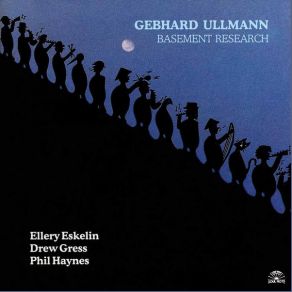Basement Research
Download links and information about Basement Research by Gebhard Ullmann. This album was released in 1995 and it belongs to Jazz genres. It contains 10 tracks with total duration of 52:41 minutes.

|
|
|---|---|
| Artist: | Gebhard Ullmann |
| Release date: | 1995 |
| Genre: | Jazz |
| Tracks: | 10 |
| Duration: | 52:41 |
| Buy it NOW at: | |
| Buy on iTunes $9.90 | |
Tracks
[Edit]| No. | Title | Length |
|---|---|---|
| 1. | D. Nee No (featuring Ellery Eskelin, Drew Gress, Phil Haynes) | 6:06 |
| 2. | Think Tank (featuring Ellery Eskelin, Drew Gress, Phil Haynes) | 2:53 |
| 3. | Cafe Toronto (featuring Ellery Eskelin, Drew Gress, Phil Haynes) | 5:43 |
| 4. | Oberschoneweide (featuring Ellery Eskelin, Drew Gress, Phil Haynes) | 6:02 |
| 5. | New No-ness (featuring Ellery Eskelin, Drew Gress, Phil Haynes) | 5:42 |
| 6. | High Lam Earth (featuring Ellery Eskelin, Drew Gress, Phil Haynes) | 5:22 |
| 7. | Farbiges Lied (featuring Ellery Eskelin, Drew Gress, Phil Haynes) | 4:35 |
| 8. | Fourteen Days (featuring Ellery Eskelin, Drew Gress, Phil Haynes) | 5:21 |
| 9. | N.B. Eleven (featuring Ellery Eskelin, Drew Gress, Phil Haynes) | 4:50 |
| 10. | Basement Research (featuring Ellery Eskelin, Drew Gress, Phil Haynes) | 6:07 |
Details
[Edit]This set features European saxophonist and clarinetist Gebhard Ullmann with downtown New York stalwarts Ellery Eskelin on saxophones, bassist Drew Gress, and drummer Phil Haynes. The disc is aptly named in that it comes across as a dead cross between Ullmann's trademark complex and methodological approach for scoring around periods of improvisation, and a looser garage or basement date where four cats are throwing ideas around to vamp on. Ullmann is a formalist as a composer; his tonal architectures offer no seams or edges, yet they are restless and daring. On the opener, "D. Nee," the two saxophonists trade lines about half a beat behind one another, forking out a melodic framework without ever entering into a melody. The variations in pitch and tonality then provide a gateway for the rhythm section to plow out a place for improvisation on a very subtle theme and the horn players follow suit into a restrained but nevertheless labyrinthine tunnel. The mood follows on the brief "Think Tank," where a melody becomes a Moebius strip of actions and responses. The disc's most beautiful track is "Fourteen Days," which comes out of a slow, stumbling Gershwin-ian blues and opens onto a far more vast expanse in the interplay between Ullmann and Eskelin. Eskelin's raw blues wail is a gauntlet to the more restrained and refined Ullmann's Sonny Rollins-esque tone. And while the track is slow-moving and undulating, there is nonetheless hyperactive movement as Gress plots out two- and three-note lines that become chords in shifting time and Haynes dances all around the center of the beat, extrapolating the blues from space itself. This is a remarkable collaboration and one of the highlights in Ullmann's now-worthily storied career as a leader and as a composer.